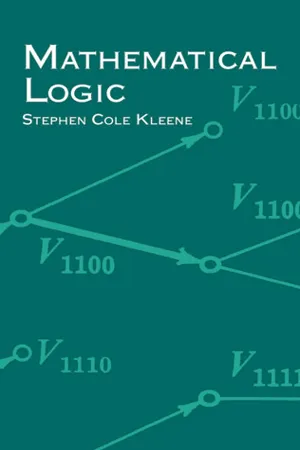
- 416 pages
- English
- ePUB (mobile friendly)
- Available on iOS & Android
Mathematical Logic
About this book
Undergraduate students with no prior classroom instruction in mathematical logic will benefit from this evenhanded multipart text. It begins with an elementary but thorough overview of mathematical logic of first order. The treatment extends beyond a single method of formulating logic to offer instruction in a variety of techniques: model theory (truth tables), Hilbert-type proof theory, and proof theory handled through derived rules.
The second part supplements the previously discussed material and introduces some of the newer ideas and the more profound results of twentieth-century logical research. Subsequent chapters explore the study of formal number theory, with surveys of the famous incompleteness and undecidability results of Godel, Church, Turing, and others. The emphasis in the final chapter reverts to logic, with examinations of Godel's completeness theorem, Gentzen's theorem, Skolem's paradox and nonstandard models of arithmetic, and other theorems. The author, Stephen Cole Kleene, was Cyrus C. MacDuffee Professor of Mathematics at the University of Wisconsin, Madison. Preface. Bibliography. Theorem and Lemma Numbers: Pages. List of Postulates. Symbols and Notations. Index.
Tools to learn more effectively

Saving Books

Keyword Search

Annotating Text

Listen to it instead
Information
Logic
ELEMENTARY MATHEMATICAL LOGIC
Table of contents
- Cover
- Title Page
- Copyright Page
- Dedication
- Preface
- Contents
- Part I. Elementary Mathematical Logic
- Part Ii. Mathematical Logic and the Foundations of Mathematics
- Bibliography
- Theorem and Lemma Numbers: Pages
- List of Postulates
- Symbols and Notations
- Index
Frequently asked questions
- Essential is ideal for learners and professionals who enjoy exploring a wide range of subjects. Access the Essential Library with 800,000+ trusted titles and best-sellers across business, personal growth, and the humanities. Includes unlimited reading time and Standard Read Aloud voice.
- Complete: Perfect for advanced learners and researchers needing full, unrestricted access. Unlock 1.4M+ books across hundreds of subjects, including academic and specialized titles. The Complete Plan also includes advanced features like Premium Read Aloud and Research Assistant.
Please note we cannot support devices running on iOS 13 and Android 7 or earlier. Learn more about using the app